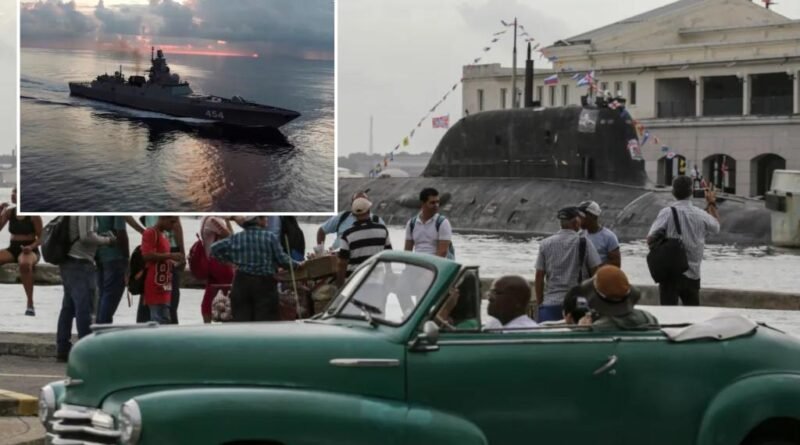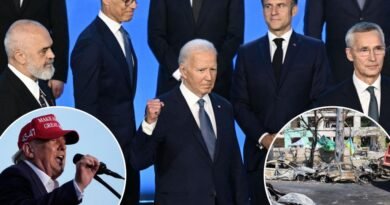Submarine and warships from Russia reach Havana

If you thought the Cold War had returned last week, you were not daydreaming.
The Kazan, a Russian nuclear-powered submarine, and accompanying surface ships, including the frigate Admiral Gorshkov, made port in Havana, Cuba, scene of several epic Cold War crises. Both the Kazan and the Gorshkov routinely carry nuclear-capable Zirkon and Kalibr cruise missiles, although Russia denied the vessels were doing so on this trip.
The Biden administration‘s reaction was schizophrenic, some officials asserting that the deployment was entirely routine, while others said the Kazan‘s nuclear capabilities clearly made it significant. Certainly, the missile test-firings by the Kazan and the Gorshkov, conducted near Florida’s coastline, brought back memories.
Moscow’s effort to show it can still project naval power far from home occurred simultaneously with this year’s G-7 meeting in Italy. Western military aid to Ukraine to defend against Russia’s 2022 invasion and the future of that aid if Donald Trump wins in November were top-tier subjects discussed among the G-7 leaders.
In Cold War parlance, the timing of Russia’s naval maneuver was no coincidence, comrade.
In what seemed an appropriate reaction to Russia’s ploy, the USS Helena, a US nuclear-powered hunter-killer submarine, promptly turned up at Guantanamo Bay, America’s base on Cuba.
But the behind-the-scenes story looks much worse for the Biden administration. News reports indicate that, upon learning of the Kazan flotilla’s destination, the White House immediately had qualms about proceeding with an unrelated, routine, previously-scheduled deployment of a US nuclear-powered submarine to Guantanamo.
An earlier US submarine call there had raised tensions with Cuba, and Biden’s advisors reportedly fretted that having Russian and US nuclear-powered submarines at the island could increase tensions with both Russia and Cuba.
Fortunately, the Pentagon argued that altering US Navy deployments in our own backyard because of a Russian intrusion into the Americas would send exactly the wrong message to Moscow, Beijing and others.
Moreover, this Russian gambit is very likely not over. Moscow’s small flotilla could well steam across the Caribbean to Venezuela in coming days, making port calls elsewhere in the region.
If the White House knows or suspects the remainder of the Russian itinerary, it is not saying.
So, is all this serious, or just play-acting by Moscow and Washington?
Vladimir Putin, for one, is not play-acting.
Russia’s unprovoked attack on Ukraine has not produced nearly the result the Kremlin expected, Russia’s economy has been damaged, and Putin’s domestic dominance in Russia shaken.
Now, however, Putin Russia has stabilized the Ukrainian battlefield, made recent, modest gains, and is strong enough internally to launch his own purges.
He sees White House bandwidth severely stretched with wars in Ukraine and the Middle East, and a tight presidential race underway. Moreover, Moscow is watching carefully to see if Biden remains deterred by his often-voiced fear of “a wider war” in Europe.
Accordingly, for Putin, now is the time to flaunt Russia’s sophisticated weaponry and its geopolitical reach, 90 miles from the Florida Keys.
The Kremlin’s show of muscle was to remind Westerners, particularly in Washington (and even Beijing’s leaders, still short on blue-water naval assets) of Moscow’s global reach.
Today, indeed, all G-7 leaders, excepting Italian Prime Minister Giorgia Meloni, are in domestic political trouble, which Moscow’s sally into the Americas helps underline.
The White House’s predictable hand-wringing and weakness exposed BIden’s worries that new foreign flare-ups and international chaos would undercut his facade of statesmanship.
In this presidential election year, the candidates should be having a serious debate about America’s proper place in the world, and what our country needs to defend its interest and values globally. Instead, we have two candidates both long past their use-by dates. This palpable lack of US international leadership is painful to watch.
Other countries see it as well, and their attitudes and expectations of Washington for the next four years are being downgraded accordingly.
John R. Bolton is a former ambassador to the United Nations and National Security Advisor.




